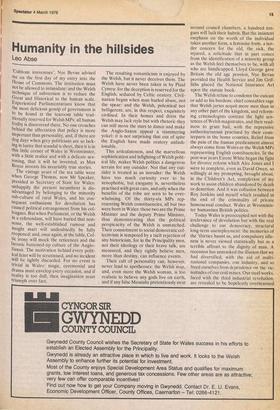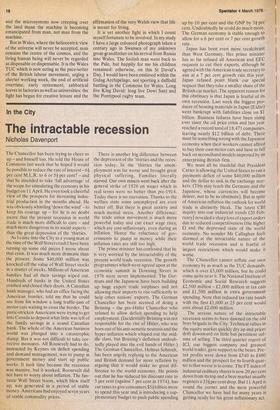Humanity in the hillsides
Leo Abse
'Cultivate irreverence', Nye Bevan advised me on the first day of my entry into the House of Commons. The institution must not be allowed to intimidate: and the Welsh technique of subversion is to reduce the Great and Historical to the human scale. Experienced Parliamentarians know that the most delicious gossip of government is to be found at the tearoom table traditionally reserved for Welsh MPs: all human frailty is discovered there. No one crouches behind the affectation that policy is more important than personality, and, if there are dog days when grey politicians are so lacking in lustre that scandal is short, then it is in this little corner of Wales in Westminster, With a little malice and with a delicate seasoning, that it will be invented, as , Max Boyce invents his invariably true stories.
The vintage years' of the tea table were When George Thomas, now Mr Speaker, Presided as Secretary of State for Wales: unhappily the present incumbent is disadvantaged by belonging to the minority sub-culture of rural Wales, and his consequent enthusiasm for devolution has caused political estrangement from his colleagues. But when Parliament, or the Welsh In a referendum, will have buried that nonsense, the well-established rumour and Insight mart will undoubtedly be fully reopened: and, once again, at the table, Celtic irony will mock the reticences and the laconic buttoned-up culture of the AngloSaxon. The motivation behind every political feint will be scrutinised, and no incident Will be lightly discarded. For no event is trivial in Wales: magic, ceremonial and drama must envelop every occasion, and if reality is too dull, then imagination must triumph over fact. The resulting romanticism is enjoyed by the Welsh, but it never deceives them. The Welsh have never been taken in by Plaid Cymru: for the deception is reserved for the English, seduced by Celtic oratory. Civilisation began when man hurled abuse, not the spear: and the Welsh, polemical not belligerent, are, in this respect, exquisitely civilised. In their homes and dress the Welsh may lack style but with rhetoric they can still move the stars to dance and make the Anglo-Saxon appear a stammering yokel: it is not surprising that out of spite the English have made oratory unfashionable.
This articulateness, and the marvellous sophistication and infighting of Welsh political life, makes Welsh politics a dangerous terrain for any outsider. Not that any outsider is treated as an intruder: the Welsh have too much curiosity ever to be xenophobic, but exogamy is, nevertheless practised with great care, and only when the benefits of the tribe are seen to be overwhelming. Of the thirty-six MPs representing Welsh constituencies, all but two were born in Wales: those two are the Prime Minister and the deputy Prime Minister, thus demonstrating that the political perspicacity of the Welsh is unmatched. Their commitment to social democratic col lectivism is tempered by a tacit rejection of any historicism, for in the Principality men, not their ideology or their brave talk, are measured, and they rightly believe men, more than destiny, can influence events.
Their cult of personality can, however, never lead to apotheoses: the Welsh man, and, even more the Welsh woman, is too realistic to believe any gods live on earth, and if any false Messiahs pretentiously strut around council chambers, a hundred tongues will lash their hubris. But the insistent emphasis on the worth of the individual takes another form, a feminine form. a tender concern for the old, the sick, the injured, a solicitude that in part comes from the identification of a minority group as the Welsh feel themselves to be, with all who are handicapped. Lloyd George gave Britain the old age pension, Nye Bevan provided the Health Service and Jim Griffiths placed the National Insurance Act upon the statute book.
The Welsh refuse to condemn the outcast or add to his burdens: chief constables rage that Welsh juries acquit more men than in any other part of the kingdom, and reforming criminologists contrast the light sentences of Welsh magistrates, and their readiness to grant bail, with the repressive authoritarianism practised by their counterparts in the home counties. Relief from the pain of the human predicament almost always come from Wales or the Welsh MPs representing English constituencies. In the post-war years Eirene White began the fight for divorce reform which Alec Jones and I were to complete, even as David Owen, so willingly at my prompting, brought about, in the Children's Act, completion of my work to assist children abandoned by death or desertion. And it was collusion between Roy Jenkins and myself which resulted in the end of the criminality of private homosexual conduct. Wales at Westminister humanises British politics.
Today Wales is preoccupied not with the irrelevance of devolution but with the real challenge to our democracy, structural long-term unemployment: the memories of the 'thirties haunt us, and compulsory idle ness is never viewed statistically but as a terrible affront to the dignity of man. A recession has unmasked the illusion that we had diversified, with the aid of multi national companies, our industry, and so freed ourselves from dependence on the vic issitudes of our coal mines. Our steel works, faced with the third industrial revolution, are revealed to be hopelessly overmanned and the microsystems now creeping over the land mean the machine is becoming emancipated from man, not man from the machine.
But in Wales, where the heliocentric view of the universe will never be accepted, man remains the centre of the cosmos, and the living human being will never be regarded as disposable or dispensable. It is the Wales TUC which is now acting as the pace-setter of the British labour movement, urging a shorter working week, the end of artificial overtime, early retirement, sabbatical leaves in factories as well as universities: the fight has begun for creative leisure and the affirmation of the very Welsh view that life is meant for living.
It is yet another fight in which I count myself fortunate to be involved. In my study I have a large coloured photograph taken a century ago in Swansea of my unknown great-grandfather on his arrival from Russia into Wales. The foolish man went back to the Pale, but happily for me his children remained: otherwise, on this St David's Day, I would have been enslaved within the Gulag Archipelago, not sporting a daffodil battling in the Commons for Wales. Long live King David: long live Dewi Sant and the Pontypool rugby team.



































 Previous page
Previous page